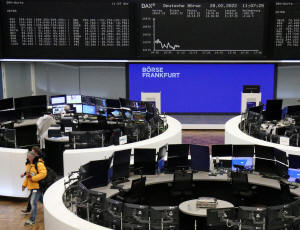Russia sanctions ripple across world markets, rouble
tanks
 Send a link to a friend
Send a link to a friend
 [February 28, 2022] By
Dhara Ranasinghe [February 28, 2022] By
Dhara Ranasinghe
LONDON (Reuters) - World stocks slid, oil
prices jumped and the rouble tanked to fresh record lows on Monday, as
the West ramped up sanctions against Russia for its attack on Ukraine
that included blocking banks from the SWIFT global payments system.
Russia's central bank raised its key interest rate to 20% from 9.5% in
an emergency move, and authorities told export-focused companies to be
ready to sell foreign currency as the rouble slid almost 30% to record
lows versus the dollar.
As an economic crisis loomed in Russia, the fallout of tougher sanctions
from the West imposed over the weekend rippled out across financial
markets.
European stocks slumped 2%. European banks most exposed to Russia,
including Austria's Raiffeisen Bank, UniCredit and Societe Generale,
dropped between 9 and 15%, while the wider euro zone banking index fell
7%.
U.S. stock futures were deep in negative territory, although MSCI's
broad gauge of Asia shares and Japan's Nikkei eked out small gains.
"The trading environment is highly dynamic, and we maintain a defensive
stance as things could get a lot worse from here," said Peter Garnry,
head of equity strategy at Saxo Bank.

Oil prices meanwhile surged after Russian President Vladimir Putin put
nuclear-armed forces on high alert on Sunday, the fourth day of the
biggest assault on a European state since World War Two.
The ramp-up in tensions heightened fears that oil supplies from the
world's second-largest producer could be disrupted, sending Brent crude
futures up 5% to $102.86. U.S. West Texas Intermediate crude futures
were up $4.62 or almost 5.0% at $96.24 a barrel.
"I am telling clients all we know for certain is that energy prices are
going to be higher, and there are going to be some beneficiaries," said
John Milroy, Ord Minnett financial advisor in Sydney.
"It's an old cliché, but it's true that uncertainty drives moves in both
directions."
[to top of second column] |

The German share price index DAX graph is pictured at the stock
exchange in Frankfurt, Germany, February 28, 2022. REUTERS/Staff

SAFE-HAVENS SHINE
As uncertainty continued to grip markets, investors plumped for the safety of
the dollar, Swiss franc and Japanese yen.
The euro slid 1% to $1.1168 and 0.9% to 129.08 yen, while the risk-sensitive
Australian and New Zealand dollars fell 0.5% and 0.3%, respectively.
Sovereign bonds such as the U.S. Treasuries and German Bunds -- regarded as
among the most safest assets to hold globally -- remained in strong demand.
The 10-year U.S. Treasury yield was down around 7 basis points to 1.90% in
London trade, and equivalent German yields were down 6 basis points to 0.16%.
Money markets continued to push back rate hike expectations with investors now
pricing roughly 30 basis points worth of tightening from the European Central
Bank in total this year, down from 35 bps late last week.
Gold was last up 0.61% to around $1,899.
Russia's rouble dived almost 30% to a record-low 120 per dollar, but recovered
some ground to last trade at just over 100 to the dollar.
MSCI's Russia equity index slid 25%, while London and Frankfurt-listed Russian
equity exchange traded funds (ETFs) tanked more than 35% as investors dumped
Russian assets.
(Reporting by Dhara Ranasinghe; Additional reporting by Kevin Buckland in TOKYO;
editing by Jason Neely)
[© 2022 Thomson Reuters. All rights
reserved.]This material may not be published,
broadcast, rewritten or redistributed.
Thompson Reuters is solely responsible for this content.
 |